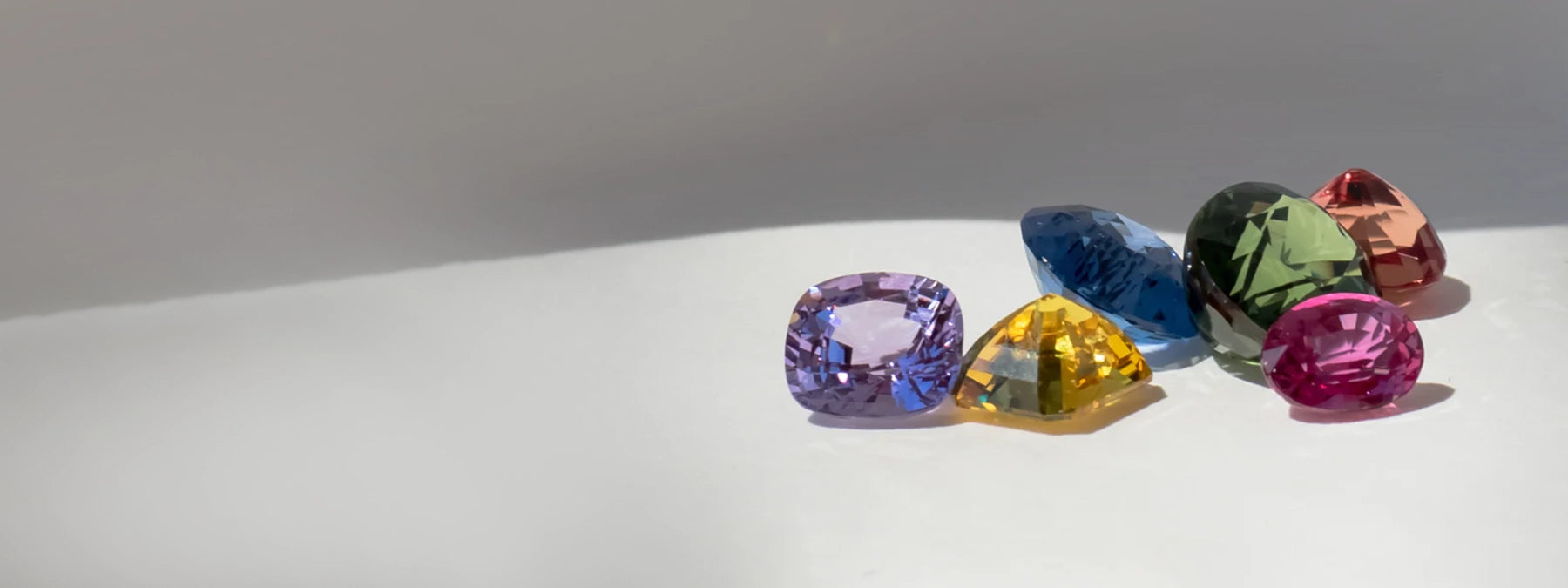
Adorn Yourself with Gemstones
Shop our beautiful collection of Gemstones. With a captivating variety of cuts and sizes, you’ll discover the perfect gemstone to match your style
Select Your Natural Gemstones
- Shape, Gemstone, Carat & Price
- Color, Clarity & Intensity
- More Filters
-
Reset Filters
Do you want to reset filters ?
-
« »
There are many popular shapes for diamonds although its Shape is very different from its Cut. A diamond shape is determined by its silhouette when ‘face up’.
A diamond shape is considered when it in its rough stage of development and our craftsmen and women decide what would be the optimum shape to cut given the diamonds inclusions, overall size and proportions.
- round
- princess
- emerald
- asscher
- marquise
- oval
- radiant
- pear
- heart
- cushion
There are many popular shapes for diamonds although its Shape is very different from its Cut. A diamond shape is determined by its silhouette when ‘face up’.
A diamond shape is considered when it in its rough stage of development and our craftsmen and women decide what would be the optimum shape to cut given the diamonds inclusions, overall size and proportions.
- round
- princess
- emerald
- asscher
- marquise
- oval
- radiant
- pear
- heart
- cushion
Contrary to popular belief, a ‘Carat’ is the unit used to measure a diamond’s weight, not the diamond shape or size. The word Carat originates from a tree more commonly known as the Carob tree .
In ancient times, before scales and units of mass were invented, diamond traders compared the weight of a diamond to the seeds of the Carob tree.
Not to worry, we don't believe the bigger rock means the bigger the love. We believe Values are the new value. If it is true love we know she or he will be happy with however much you spend :)
This natural phenomena in both mined and lab grown diamonds happens for a few reasons. More commonly molecules nearby can make their way into the diamond lattice as it grows. This causes varying colour hues of brown to yellow to blue. Structural anomalies can cause other colour variations such as those in pink and the very rare red diamonds.

-
Red
-
Green
-
Blue
-
Dark Blue
-
Black
-
Orange
-
Grey
-
Yellow
-
Pink
-
Purple
-
White
As mined diamonds, or lab diamonds grow, small flaws and inclusions can feature in their structure. These natural birthmarks are nature’s own fingerprints. We believe these natural features give our diamonds their own distinctive DNA. Diamond clarity is graded on the basis of how many inclusions and flaws can be spotted in a diamond, under magnification or with the naked eye.








These diamonds have noticeable inclusions that can easily seen with 10x magnification, but not are not easily visible through the crown with the unaided eye at arms length.
These diamonds have noticeable inclusions that can easily seen with 10x magnification, but not are not easily visible through the crown with the unaided eye at arms length.
These diamonds have minor inclusions that are difficult to somewhat easy for a trained grader to see when viewed under 10x magnification.
Diamonds in this clarity grade have inclusions which are very minute and somewhat difficult for a skilled grader to see under 10X magnification.
Diamond is a very high clarity rating where the diamonds are “almost perfect”. At this grading, inclusions though slightly more than VVS1, are so insignificant that it is difficult even for a trained gemologist to detect them under 10X magnification.
Diamond is a very high clarity rating where the diamonds are “almost perfect”. At this grading, inclusions are so insignificant that it is difficult even for a trained gemologist to detect them under 10X magnification.
Internally Flawless (IF) diamonds have no inclusions visible under 10x magnification, only small blemishes on the diamond surface.
Flawless with no internal or external flaws. Extremely rare and valuable.
-
EC1
-
EC2
-
VS1
-
VS2
-
I1
-
I2
-
Tl
-
O
Possibly the most important feature of a diamond’s craftsmanship is its Cut. The brilliance of a diamond is very much determined by its ability to reflect and refract light. It represents the skill with which our Diamantaires have crafted it.




This cut grade doesn’t retain the light entering the diamond, so the perceived fire and brilliance is greatly reduced.
When seen from the top-down view, Good Cuts don’t reflect light as much as the higher grades because their fire, brilliance, and scintillation are more subdued. You may observe darker areas in the stone.
When seen from the top-down view, it can show a slightly more asymmetrical pattern of light. It is still a premium cut but has slightly lower brilliance than the Excellent cut.
When seen from the top-down view the diamond exhibits optimal fire and brilliance as virtually all the light that enters is reflected by the diamond to the viewer's eye.
-
D Dark
-
DP Deep
-
V Vivid
-
I Intense
-
MI Medium Intense
-
L Light
-
VL Very Light
- No Enhancement
- Heated
- Insignificant Clarity Enhancement
- Minor Clarity Enhancement
- Moderate Clarity Enhancement
- Impregnated
- Other
- Sri Lanka
- Madagascar
- Basaltic
- Mozambique
- Myanmar
- Tanzania
- Colombia
- Russia
- Zambia
- East Africa
- Ethiopia
- Unknown
- Shape
- carat
- colour
- price
- cut
- clarity
